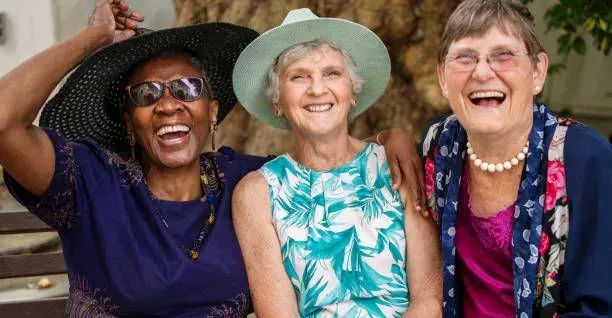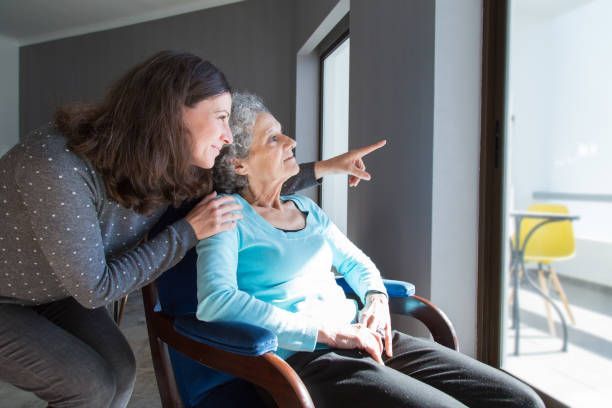How to Cope When Your Elderly Loved One Doesn’t Recognize You
How to Cope When Your Elderly Loved One Doesn't Recognize You
Coping with a loved one’s dementia can be deeply challenging for families and friends, as they witness changes in memory, behavior, and personality that can feel disheartening and overwhelming. At 7 Day Home Care, we understand the emotional toll that dementia can bring and offer specialized in-home dementia care tailored to support both clients and their families. Our experienced caregivers are trained in dementia-specific approaches to enhance safety, comfort, and engagement for individuals with dementia, providing relief to families who may struggle to manage these needs on their own. From helping maintain a daily routine to ensuring compassionate communication and specialized care, 7 Day Home Care is dedicated to helping families navigate the journey of dementia with dignity and peace of mind.
7 Day Home Care provides home care services in Manhattan, Queens, Brooklyn, Nassau County, and Suffolk County, New York. To learn more about our home care services near you, please call 516-408-0034.

Memory Loss is Incredibly Challenging for Family and Friends
As our loved ones age, cognitive decline, especially due to conditions like Alzheimer’s disease or dementia, may lead them to experience memory loss. This can be incredibly challenging, particularly when they no longer recognize family members or close friends. If you’re in this situation, you’re not alone. Many families face similar challenges, and while it can be emotionally taxing, there are ways to cope and help improve the quality of life for your loved one. This article explores coping strategies, communication tips, and actionable steps you can take to manage the emotional toll of such experiences.
1. Understanding Memory Loss and Dementia
What is Dementia?
Dementia is a general term for a decline in mental ability severe enough to interfere with daily life. Alzheimer’s disease is the most common form of dementia, but there are other types as well, including vascular dementia, Lewy body dementia, and frontotemporal dementia. Memory loss in these conditions often progresses over time, eventually impacting short-term memory, recognition, and even long-term memories .
Why Does Memory Loss Affect Recognition?
Recognition, or the ability to identify people and objects, relies on complex neural processes that can become impaired with dementia. This can lead to a decline in facial recognition, even for familiar faces. Understanding that this is a natural progression of the disease, rather than a lack of care or affection, can be comforting for caregivers .
2. Coping Strategies for Dementia Caregivers
Accept the Reality of Their Condition
It’s crucial to understand that your loved one’s behavior is due to their condition and not intentional. Embracing this reality can help alleviate feelings of frustration or sadness. Recognizing that they are not purposefully forgetting or ignoring loved ones can make it easier to approach caregiving with compassion and patience.
Allow Yourself to Grieve
When a loved one no longer recognizes you, it’s natural to feel a sense of loss. Giving yourself permission to grieve for the relationship as it was before the illness is essential. Finding support through family, friends, or support groups can help you work through these emotions in a healthy way.
Maintain Consistent Routines
A consistent routine can provide a sense of stability and familiarity for someone with dementia. Familiarity is often comforting, even when specific memories may be lost. By establishing a daily routine, you can reduce anxiety for your loved one and make interactions smoother.
3. Effective Communication Techniques for Dementia Care
Speak Gently and Use Simple Language
When speaking with someone experiencing memory loss, it’s best to keep conversations clear and straightforward. Avoid complex sentences or topics that may be difficult for them to follow. A gentle tone can also make interactions more pleasant and less overwhelming.
Focus on Emotion Over Facts
People with memory loss may not remember events or recognize people, but they often respond to emotions. If you sense they are happy, sad, or anxious, address those feelings without emphasizing forgotten details. For example, if they seem unsettled, you could say, “I’m here with you, and you’re safe,” rather than trying to remind them of who you are or where they are.
Use Visual Cues
When words fail, non-verbal communication can be powerful. Showing photographs or objects associated with memories may sometimes spark recognition or provide comfort, even if they can’t verbally acknowledge it.
4. Activities to Foster Connection in Dementia Care
Engage in Meaningful Activities Together
Participating in simple activities like looking through photo albums, listening to familiar music, or doing puzzles together can bring joy and create moments of connection, even if they no longer recognize you. Focus on activities they’ve always enjoyed, as this can help maintain a sense of familiarity and enjoyment.
Use Touch to Communicate
Gentle touch can sometimes convey a sense of reassurance and care. A hug, holding hands, or even a light touch on the shoulder can create a connection that words may no longer convey. However, always be mindful of their comfort level, as some people with dementia may become startled by unexpected touch.
Bring in Their Favorite Sights, Sounds, and Smells
Memory recall isn’t only visual; sounds, scents, and even tastes can help. Consider bringing in sensory cues such as favorite perfumes, music, or familiar foods that may remind them of pleasant memories. This can sometimes lead to brief moments of recognition or simply offer comfort in the present.
5. Managing Emotional Strain as a Dementia Caregiver
Seek Support Groups
Support groups provide a safe space to share experiences and learn from others facing similar challenges. Engaging in a support group can offer emotional support, coping strategies, and resources. Some options include groups specifically for Alzheimer’s and dementia caregivers, either in person or online.
Consider Professional Counseling
It’s normal to feel overwhelmed when caring for a loved one who no longer recognizes you. A counselor or therapist can provide coping tools tailored to your specific emotional needs. They can also help you address feelings of grief, frustration, and sadness in a constructive way.
Take Breaks When Needed
Caring for someone with memory loss is demanding. Give yourself permission to take breaks and accept help from others. Whether it’s through respite care services or family support, taking time for self-care is vital for your well-being and ability to provide compassionate care.
6. Additional Resources and Support for Dementia Care
Home Care Services for Specialized Support
Home care services can provide specialized support tailored to the needs of individuals with dementia. Caregivers trained in dementia care can assist with daily tasks and offer companionship, giving family members time to focus on their relationship with their loved one without the added stress of caregiving responsibilities.
Explore Financial and Medical Resources
Navigating the financial and medical aspects of dementia care can be challenging. Organizations like the Alzheimer’s Association offer resources, guidance on long-term care options, and access to support services. Consider speaking with a social worker or care manager to explore financial assistance programs, insurance coverage, and care planning.
Technology Tools for Memory Care
Several technology tools, such as memory care apps and digital reminders, can help you and your loved one maintain a routine and reduce confusion. Apps that track medications, appointments, or daily tasks can ease the caregiving process, allowing for greater organization and lessened stress.
7. Empathy and Understanding: Staying Connected Even When Recognition Fades
Approach Each Day with Patience
Every day with a loved one who has memory loss can be different. Some days, they may seem closer to their former selves, while on others, they may be withdrawn. Approaching each day with patience and compassion can help you maintain resilience in the face of these changes.
Celebrate Small Moments
Look for small victories and cherish simple moments of connection. If they respond to a smile, laugh at something funny, or enjoy a familiar song, embrace these moments without focusing on the losses. These small gestures and reactions can be reminders that a part of your loved one is still present, even if it’s not in the way you once knew.
Practice Self-Compassion
Remember, it’s normal to feel sadness, frustration, or even anger at the situation. Being a caregiver is not easy, and it’s essential to acknowledge your own needs and feelings. Be kind to yourself, knowing you’re doing the best you can under challenging circumstances.
Navigating Memory Loss with Grace and Resilience
When an elderly loved one no longer recognizes you, it’s an emotionally complex journey. Although you may feel sadness, frustration, or loss, understanding that these changes are part of the disease can help. By focusing on empathy, seeking support, and embracing moments of connection, you can navigate these challenges while maintaining a meaningful relationship, even if it looks different than before.
Remember, resources are available to help you manage the demands of caregiving. At 7 Day Home Care, our team of compassionate caregivers is trained to support families coping with dementia and other forms of memory loss. Reach out today at 516-408-0034 to learn more about how we can help you provide the best care for your loved one while also caring for yourself.
Brian Callahan
7 Day Home Care










